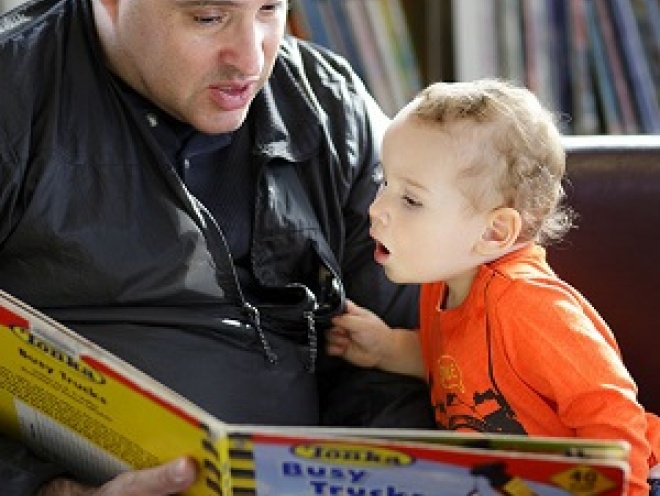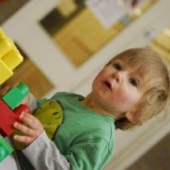There’s so much to look forward to at this age. Find out more about how your child will begin to develop in areas like walking, talking and sleep.
Development
Welcome to a really exciting stage, as your child goes through lots of developmental changes around and after their first birthday. During this time, your baby will probably:
- start to walk unaided,
- start saying simple words, such as ‘dad’, ‘mum’, ‘dog’ and ‘cat’,
- use gestures to show you what they would like,
- follow simple instructions such as ‘kiss mummy’ and
- enjoy rhymes and games that use language. (Patient, 2014; Talking point, 2018)
Reading books together, reciting nursery rhymes, singing songs and pointing at objects while saying the word. These are great ways to help your child’s development and help your child to talk. They’re also easy ways to have fun together (RCSLT, 2003).
You might be keen for your child to start walking. Yet you don’t need to buy expensive items like baby walkers and shoes to help them do this.
Experts actually advise against baby walkers, as they can cause accidents because of your child’s increased speed and height (ANEC, 2010). They don’t really help either, and might in fact hinder developments. This is because walking independently is a very different skill from walking with a baby walker. (ANEC, 2010)
It’s not necessary to buy shoes for your child either, at least for when you’re at home. Indoors, it is better if they walk barefoot while they are getting the hang of it (NHS, 2017). Some people say walking without shoes might help encourage your child’s posture and foot development too.
Feeding
Drinking
When your baby is a year old, you can introduce them to full fat cow’s milk as a drink instead of formula (NHS, 2015). If you’re still breastfeeding, don’t feel you need to stop now. Continuing to breastfeed after your child’s first birthday, alongside solid foods, will carry on providing benefits for you and your baby (NHS, 2015).
It’s a good idea to stop using bottles at this stage and to let your baby drink out of a cup (NHS, 2015). They might find the habit harder to break later on.
Eating
Your baby’s appetite will have increased, and they will be able to eat smaller portions of the food you are eating. Make sure you don’t put any salt on the food they have, either while you’re cooking or afterwards.
A mixed diet is important – plenty of variety means that your baby is more likely to get the nutrients they need. If your toddler is a fussy eater then you’re not alone, as up to half of babies between 12 to 18 month old babies are described as picky eaters by their parents (Carruth et al, 2004). It’s normal and can happen when their growth slows down.
It’s worth experimenting with different foods until you find what they like (Carruth et al, 2004; ITF, 2006). Even if you find a food they seem to enjoy one day, it might be that they reject it the next, and vice versa.
Although it can be stressful, try not to turn mealtimes into a battleground by forcing your child to eat food they don’t want. Instead, simply try offering it another day. Research shows you might need to offer a new food up to eight to 15 times before a baby of this age accepts it (Carruth et al, 2004).
Sleeping
From about 12 months old, most babies sleep for around 12 to 14 hours in total. This is broken up into naps and overnight sleep (NHS, 2018).
Babies of this age can be unsettled though by lots of things, such as teething and starting nursery. Just as you’re getting a sleeping routine sorted it can all change again (NHS, 2018). Hang in there until the disruption passes, though talk to your health visitor if the problem continues (NHS, 2018).
Health
This stage is an important one for immunisations. At 12 months, your baby will be called for several vaccinations, some first doses and some boosters. These are Hib/MenC, Measles, mumps and rubella (MMR), Pneumococcal conjugate vaccine (PCV) and MenB (NHS, 2016).
Playtime
You’re in for a lot of fun as your baby’s coordination will have developed a lot by now. As their walking improves, your baby might enjoy pushing a trolley or other toys on wheels. Have fun exploring the world with them, taking your cue from whatever they seem to enjoy.
You could play games like talking to them on a pretend telephone (Talking point, 2018). You could also try squishing play dough into shapes.
Your child might like making simple jigsaws or playing musical instruments like tambourines – often the noisier the better. This is an age where they’ll love exploring the world around them.
Whatever you do, you don’t need to splash out a fortune on fancy toys. You can find lots of bargains at NCT Nearly New Sales or second hand shops, as well as hand-me-downs from friends.
Just be aware, you might discover that banging a wooden spoon on a saucepan can keep them happy for hours too.
Safety
Now that your baby is walking, they might find a new set of hazards. They may learn to open doors, for example, or start climbing onto tables.
You can take simple steps to keep your baby safer, like investing in stair gates and keeping hot drinks out of reach. While it’s impossible to completely baby-proof your home, you should never leave your child unsupervised near water, on a high surface or in the kitchen (ROSPA, 2018).
Encourage your child to hold your hand when you are out and about, and start talking about road safety with your child. For more about safety around the home for children, see the ROSPA website.
Taking care of yourself
This is a time that many mums return to work and start juggling life as a working parent. Paying for childcare, if you need, can take some balancing with your other incomings and outgoings. It can help to work out a budget and assess your finances, so you know exactly how much money is coming in and out.
This page was last reviewed in November 2018.
Further information
Our support line offers practical and emotional support with feeding your baby and general enquiries for parents, members and volunteers: 0300 330 0700.
You might find attending one of our Early Days groups helpful as they give you the opportunity to explore different approaches to important parenting issues with a qualified group leader and other new parents in your area.
Make friends with other parents-to-be and new parents in your local area for support and friendship by seeing what NCT activities are happening nearby.
ANEC (2010) Baby walkers. Available at: https://www.kindengezin.be/img/standpunt-european-child-safety-alliance…;(Accessed 13th November 2018).
Carruth BR, Ziegler PJ, Gordon A, Barr SI. (2004) Prevalence of picky eaters among infants and toddlers and their caregivers' decisions about offering a new food. J Am Diet Assoc. 104(1 Suppl 1):s57-64. https://medical.gerber.com/docs/default-source/pdfs/picky_eaters_among_… 13th November 2018).
Infant and toddler forum (2006) How to manage simple faddy eating in toddlers. Toddler factsheet 2.2. https://infantandtoddlerforum.org/media/upload/pdf-downloads/2.2_How_to… (Accessed 13th November 2018).
NHS (2018) Getting baby to sleep. Available at: https://www.nhs.uk/conditions/pregnancy-and-baby/getting-baby-to-sleep/ (Accessed 13th November 2018).
NHS (2017) Baby leg and foot problems. Available at: https://www.nhs.uk/conditions/pregnancy-and-baby/leg-and-foot-problems/ (Accessed 13th November 2018).
NHS (2016) Vaccinations. Available at: https://www.nhs.uk/conditions/vaccinations/ (Accessed 13th November 2018).
NHS (2015) Drinks and cups for children. Available at: https://www.nhs.uk/conditions/pregnancy-and-baby/drinks-and-cups-children/ (Accessed 13th November 2018).
Patient (2014) Delay in walking. Available at: https://patient.info/doctor/delay-in-walking#nav-0 (Accessed 13th November 2018).
RCSLT (2003) Help your child to talk. Available at: https://www.rcslt.org/docs/free-pub/helpyourchildtotalk.pdf (Accessed 13th November 2018).
ROSPA (2018) Baby proofing. https://www.rospa.com/resources/hubs/keeping-kids-safe/baby-proofing/ (Accessed 13th November 2018).
Talking Point (2018) 12-18 Months. Available at: http://www.talkingpoint.org.uk/ages-and-stages/12-18-months (Accessed 13th November 2018).






